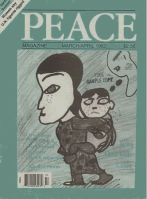
Peace Magazine Mar-Apr 1992, page 28. Some rights reserved.
Search for other articles by PMag staff here
The Helsinki Citizens Assembly is an organization for the citizens of all 48 nations belonging to the Conference on Security and Cooperation in Europe (CSCE). Its commissions work on such issues as human rights, peace and disarmament, women, nationalism and federalism, culture and communications, economics and environment.
Our national committees is called the Canadian Citizens Committee for the Helsinki Process (CCAHP) and we invite Canadians to join who are interested in any of the above issues. The coordinators are: Fergus Watt, of the World Federalists (#207-145 Spruce Street, Ottawa, KJR SPJ, Phone 613/2324)647 fax 6131563-0017) and Steve Dankowich of ACT for Disarmament (736 Bathurst St. Toronto M55 2R4, phone 416/531-6154; fax 416/531-5850).
By Metta Spencer
THE UPCOMING annual assembly of HCA will take place March 26-29th in Bratislava, Czecho-Slovakia, with an expected 700 delegates present. (See Andrew Pakula's interview with Mient Jan Faber for a further description of the ongoing activities of HCA.)
As of mid-February, there are still openings on the Canadian delegation. The theme this year is "New Walls in Europe: Nationalism and Racism." The registration fee is $100 and there are flights available from Toronto to Vienna for about $600. Bratislava is only a one-hour train ride from Vienna. Canadians need no visa. Accommodations start at $30 per night, including breakfast.
HCA had to face serious, divisive problems during its first year. For one thing, the Eastern Europeans are living in a post-communist period when public opinion has deeply conservative leanings. (Margaret Thatcher is a favorite idol there.) Participants from the West tend to favor social democracy or "green" politics and economics, which makes for conflict within the organization. Moreover, nationalism is regarded by many people in the Eastern countries as a progressive tendency, while many Westerners abhor it. Initially, HCA was envisaged as a means of promoting the integration of Europe, not its splintering. The war in Yugoslavia, for example, has brought the fight into the heart of the organization; several founding members of HCA are on opposite sides of this conflict. (Indeed, Bratislava is in Slovakia, which will hold a plebiscite about separating. Expect dramatic scenes!)
HCA began functioning before the constitutional details of its structure were established. The value of a structure document is that it defines the procedures for resolving disputes before substantive issues arise. This was not done, and therefore the legitimacy of policies can now be challenged by particular groups with commitments to specific issues. It may be more difficult to reach agreement on a constitution now than a year or so ago.
I will be chairing a working group to create a structure. My hope is to build into the structure strong mechanisms to preserve democracy. Coordinating coalition organizations tend to become overly centralized and eventually even to compete with the grass-roots organizations that are supposed to be its members. Moreover, as political sociologist Robert Michels once noted, organizations almost inevitably cease being democratic; he called this observation the "iron law of oligarchy." If it can be solved at all, attention must be paid to it from the outset. Many of you will remember the debate that preceded the founding of the Canadian Peace Alliance as to whether it should be a network or a lobbying group. I don't think we solved that one, and I welcome new ideas and suggestions. Please write me at PEACE. U

Peace Magazine Mar-Apr 1992, page 28. Some rights reserved.
Search for other articles by PMag staff here